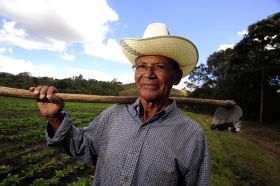What is the culture of Managua, Nicaragua?
Kent Payne
 Managua is a community of 1.3 million people of all social and economic strata, many of whom are very, very poor. That only thing that they care about is making a living and being with their families on holidays. That’s pretty much true across the board.
Managua is a community of 1.3 million people of all social and economic strata, many of whom are very, very poor. That only thing that they care about is making a living and being with their families on holidays. That’s pretty much true across the board. We from the United States, especially, got such a bad and incorrect taste of what Nicaragua is really like from the 80’s when we had the Iran-Contra affair. The the fact is that the only...
 Managua is a community of 1.3 million people of all social and economic strata, many of whom are very, very poor. That only thing that they care about is making a living and being with their families on holidays. That’s pretty much true across the board.
Managua is a community of 1.3 million people of all social and economic strata, many of whom are very, very poor. That only thing that they care about is making a living and being with their families on holidays. That’s pretty much true across the board. We from the United States, especially, got such a bad and incorrect taste of what Nicaragua is really like from the 80’s when we had the Iran-Contra affair. The the fact is that the only politics in Managua are what happens day-to-day and and who’s going to pick up the trash. This place is very, very tranquil and all the government wants to do here is improve the quality of life of the poor people so that those in the government can can get more votes and stay in power. That’s pretty much it, that’s pretty much the way it is in the United States as far as I can tell.
As a non-Nicaraguan there are just some little things that you should know. For example, workers on the average in the sugarcane fields get paid US $3.50 / day and the regular pay for domestic help is 55 to 60 cents / hour; that’s about $5/day. We pay our people better than that at Gran Pacifica and they’re glad to have what they consider to be very, very good jobs, and they are good jobs, comparatively.
I have never taken exception to my wait staff in Nicaragua. They have been extremely gracious and attentive and in some places almost be too much so – when my glass of water gets halfway empty, it gets filled to the top again before I can turn around. The reason I mention this is that, in restaurants, especially, there is what’s called “propina voluntaria” (voluntary tip) of 10% that they add to every bill. You and I might be used to tipping 15%. So what you have to do if you are in a restaurant, is you make sure that the voluntary tip is on there. If you get really good service, I believe you should normally leave a few bucks for the guy who is waiting on you.
I tend to talk with the local Nicaraguans, for example, when I’m waiting in line someplace. If you ask 3-4 questions to a stranger about their family, in 20 minutes you will know everything you need to know about the grandkids, what’s going on in the family, who’s sick and who’s doing great, all that kind of stuff. They will just unload the whole story on you. So they really are very family oriented, much more so than we are in the States.
Posted September 5, 2014


